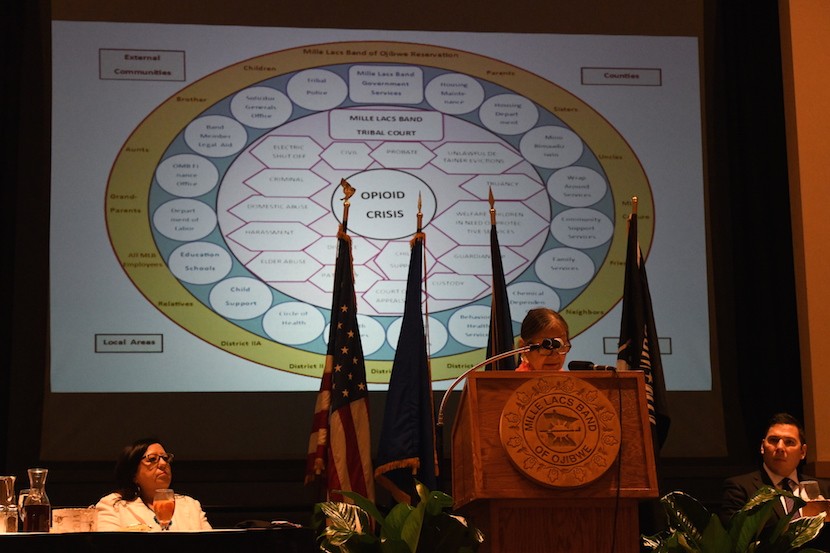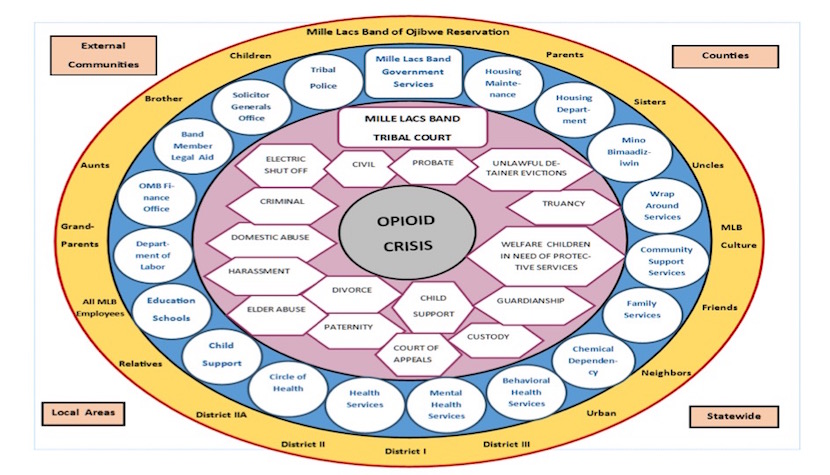
By Chief Justice Rayna Churchill Photo by Steve Kohls/Brainerd Dispatch
Aaniin, Madame Chief Executive Benjamin, distinguished members of the Band Assembly, my fellow Mille Lacs Band Members, employees and guests, welcome to the 2018 State of the Band Address. It is a pleasure to provide you with the State of the Judiciary Address as prescribed by the Band Statutes.
On behalf of the Judicial Branch, it is a pleasure to see all of you brave the cold weather and attend this annual event.
I, Rayna Churchill serve as the Chief Justice as well as the District III Appellate Justice. Clarence Boyd, Zah gah gew, serves as the District I Appellate Justice, and our newest member, Binesi ikwi, Ramona Applegate, serves as the District II Appellate Justice. Please stand and be recognized.
The Appellate Justices hears cases appealed from the District Court. We also hear Mille Lacs Band Election Disputes and Unlawful Detainer cases as prescribed by the Band Statutes.
At the District Court level, Honorable David Christensen, Mah ishuu Mah guhreec, primarily hears cases involving family matters, truancy, child support, civil, criminal, domestic violence and harassment matters. Please stand to be recognized.
In 2017, we saw a 6% increase from 2016 in new court case filings, which is approximately 80 additional cases. There were 1780 hearings conducted and 3,621 orders issued by the court in 2017. The District Court Judge, Special Magistrates, Court Staff, Bailiff/Process Server and Guardians ad Litem worked diligently on all of the cases filed and heard. I would like to give them a nod in appreciation for their dedication to the Judicial Branch and the work they do to provide justice. Thank you!
I would like to turn your attention to the presentation on the screen. As you can see this is a drop of water, which has caused a ripple effect. A ripple effect can be positive or negative depending on the situation.

Within our court system, we have noticed during the past two years, the effect the opioid crisis has in all types of court cases.

For example, in the center is the opioid and drug crisis. The impact it has had on the Tribal Court is shown on this slide in the maroon tint. The opioid ripple effect, caused:
• The need for children to be removed from homes, which in turn resulted in guardianship and custody petitions being filed.
• An increase in truancy cases.
• An increase in domestic abuse and harassment orders issued,
• Elder abuse issues.
• More unlawful detainer filings, which are evictions from Band homes.
• Increase child support & paternity cases,
• Criminal and civil complaints; and,
• Lastly, electric shut off for the homes of those who use these drugs.
This, in turn, has affected the Mille Lacs Band Government Services in many areas as shown in the blue ripple. Whether it is Tribal police being called, Housing Maintenance boarding up and renovating homes, Family Services removing children from their homes for their safety, Health & Human services departments addressing the needs of the users, their families and children; Circle of Health costs, the finance office, etc. Each department is affected. The ripple effect moves outward touching the reservation in all areas as indicated in gold. Districts 1, 2, 3 and the Urban area. Immediate family members, relatives, friends, neighbors, and all employees that work on or for the reservation are impacted. We cannot forget that it affects the culture and traditions of the Band as well. Lastly, the ripple affects the external communities – meaning the surrounding towns, counties and statewide.
The opioid problem is not new to the Mille Lacs Band; however, it significantly resurfaced the past two years. This year alone there were 12 deaths directly related to heroin and substance abuse that we are aware of. That is one death a month for our small community. There may be other casualties indirectly related to the use of drugs. This is not acceptable.
I read in the Band’s newsletter that every department supervisor from the Band’s Health and Human Services Department attended a meeting to create a coordinated response to prevention and treatment. I was happy to read that article because it means that we are moving in the right direction.
A major goal that I mentioned at last year’s State of the Band was to conduct a Band-wide Justice System Strategic Planning Meeting after everyone had time to review the Needs Assessment. The goal was attained in 2017. During the last two days in August, the Center for Court Innovation assisted us in the Strategic Planning meeting in which all of the elected officials were invited and many of the Elected Officials, Commissioners and Directors participated. After two additional condensed sessions in October and November, we completed the strategic planning matrix. The outcome of the strategic plan indicates several goals and objectives to address the gaps in the Band’s services. (Please move to the next slide)
For presentation purposes, I will condense the top five problems indicated by the planning stakeholders (See below for the complete statements.)
- Our MLB Statutes are outdated and need to be revised to improve the administration of justice within the Band.
- Substance Abuse is the most pressing community safety concern. We need to develop a culturally acceptable, collaborative, healing based approach within the justice system to address substance abuse.
- There is a lack of cultural practices within the justice system. Cultural practices, traditional forms of dispute resolution and healing should be incorporated into the justice system.
- Truancy and Juvenile delinquency threaten the future of the Band. We need to develop a response to address truancy and provide resources for the youth.
- The Mille Lacs Band should strengthen communication and cooperation among internal and external justice system agencies, social service providers and community–based partners at all levels.
I will be reaching out to the other two branches to request a three-branch meeting to create a plan of action to address the goals and objectives determined by the Stakeholders in the Strategic Planning Meeting.
In 2017, we strengthened court security by implementing the use of a walk-through metal detector and handheld wand to ensure the safety of all who enter the courtroom.
Due to the increase in number and the complexity of court cases, we received additional funding for another Special Magistrate to conduct hearings on Mondays for the next two years. This will give the District Court Judge time outside of the courtroom to compose orders. We also received additional funding for another court clerk.
We have added a second week of hearings on the Band Website so that it now displays two consecutive weeks of the court docket.
Based on the issues that we see on a daily basis in the Judicial Branch, I would like to take the time to recognize those individuals who have appeared in court– any court - due to drugs, alcohol or any addiction, and have overcome them. I applaud those individuals who have the strength and determination to overcome their dependency, and reached for a higher purpose in life. It is a pleasure to see these individuals moving forward in life and reaching out to others to help them as well. Chimiigwech!
In closing, the Mille Lacs Band can move beyond the opioid crisis and other drug related problems. This does not define who we are as a Band, as Ojibwe Ainishinabe, as a people that speak and practice the traditional ways. We can overcome by uniting – each Branch working in unison to accomplish an end-result. Every one of us has been affected, in one way or another, by this crisis – thus the ripple effect. As stated earlier, I will be reaching out to the other two branches to determine a date for a three-branch meeting so that we can address these issues.

We need to come together and be that drop of water that causes a ripple effect of a positive nature. I found this quote from the Dalai Lama to be profound and wanted to share it with you.
“Just as ripples spread out when a single pebble is dropped into water, the actions of individuals can have far-reaching effects."
Let’s move the Band forward as a whole, as a tribe united, to make a difference for our members.
Thank you for attending the 2018 State of the Band Address.
Mille Lacs Band Justice System Strategic Plan
PROBLEM STATEMENT #1: Stakeholders agree that there are numerous Mille Lacs Band of Ojibwe statutes that are missing, outdated, ineffective, or contradictory and these statutes should be updated, revised, repealed, or created in order to improve the efficient, equitable, and culturally congruent administration of justice within the tribal court.
PROBLEM STATEMENT #2: Substance abuse is the most pressing community safety concern for the Mille Lacs Band. There is strong community support for developing thorough collaborative, preventative healing-based treatment, and culturally acceptable approaches within the justice system to address substance abuse.
PROBLEM STATEMENT #3: There is a lack of cultural practices within the justice system affecting stakeholders and tribal members. Cultural practices and traditional forms of dispute resolution and healing should be incorporated into the justice system.
PROBLEM STATEMENT #4: Truancy and juvenile delinquency have a negative impact on the community and can threaten the healthy future of the Band. Most juvenile offenses are currently handled by county courts. The Band should assert a greater degree of sovereignty over juvenile justice matters and community youth by developing a more coordinated response to addressing truancy and providing additional programming and resources for youth.
PROBLEM STATEMENT #5: The Mille Lacs Band of Ojibwe justice system should be strengthened by improving communication and cooperation among internal and external justice system agencies, social service providers, and community-based partners at tribal, local, state and federal levels.